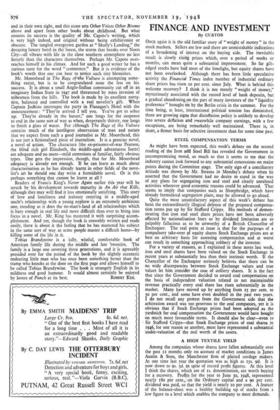FINANCE AND INVESTMENT
By CUSTOS
ONCE again it is the old familiar story of " weight of money " in the stock markets. Sellers are few and there are unmistakable indications of a broadening of interest on the buying side. The inevitable result is slowly rising prices which, over a period of weeks or months, can mean quite a substantial improvement. So far gilt- edged stocks have had most of the limelight, but equity shares have not been overlooked. Although there has been little speculative activity the Financial Times index number of industrial ordinary share prices has risen to per cent. since July. What is behind this welcome recovery? I think it is not merely "weight of money," mysteriously associated with the record level of bank deposits, but a gradual abandoningkon the part of many investors of the " liquidity preference " brought ;oh by the Berlin crisis in the summer. For the time being, at least, international political tension has diminished, there are growing signs that disinflation policy is unlikely to develop into severe deflation and meanwhile company earnings, with a few exceptions, are being remarkably well maintained. There is, in short, a firmer basis for selective investment than for some time past.
STEEL COMPENSATION TERMS
As might have been expected, this week's debate on the second reading. of the Iron all Steel Bill has revealed the Government in uncompromising mood, so much so that it seems to me that the industry cannot look forward to any substantial concessions on major points during the Committee stage. The only sign of a conciliatory attitude was shown by Mr. Strauss in Monday's debate when he asserted that the Government had no desire to stand in the way of any plans for segregating iron and steel and clearly unrelated activities wherever good economic reasons could be advanced. That seems to imply that companies such as Sheepbridge, which have already formulated segregation plans, may be allowed to go ahead.
Quite the most unsatisfactory aspect of this week's debate has been the extraordinarily illogical defence of the proposed compensa- tion terms put up by Sir Stafford Cripps. His methods of demon- strating that iron and steel share prices have not been adversely affected by nationalisation fears or by dividend limitation are so palpably fallacious as to be unworthy of a British Chancellor of Exchequer. The real point at issue is that for the purposes of a compulsory take-over of equity shares Stock Exchange prices are at best an arbitrary basis for assessing compensation and at worst can result in something approaching robbery of the investor.
For a variety of reasons, as I explained in these notes last week, iron and steel shares have been valued on the Stock Exchange in recent years at substantially less than their intrinsic worth. If the Chancellor of the Exchequer seriously believes that there can be no wide discrepancies between Stock Exchange values and true values let him consider the case of colliery shares. It is the fact that since the Government decided to award coal compensation on the basis of independent valuation related to net maintainable revenue practically every coal share has risen substantially in the market. Many have moved up by anything from 25 per cent, to 5o per cent., and some have even doubled in the past two years. I do not recall any protest from the Government side that the arbitration award was too generous to the coal companies, yet it is obvious that if Stock Exchange prices had been adopted as the yardstick for coal compensation the Government would have bought on much more favourable terms. It should also be clear—even to Sir Stafford Cripps—that Stock Exchange prices of coal shares in 1946, for one reason or another, must have represented a substantial under-valuation of the real worth of the assets. .,
A HIGH TEXTILE YIELD
Among the companies whose shares have fallen substantially over the past 12 months only on account of market conditions is James Austin & Sons, the Manchester firm of plaited cordage makers. At one time last year the quotation was as high as iss. 9d. It is now down to 9s. 3d..in spite ,of record profit figures. At this level I think the shares, which are of is. denomination, are worth buying for a recovery. Profits for the year to June 3o, 1948, represented nearly 18o per cent., on the Ordinary capital and a 90 per cent. dividend was paid, so that the yield is nearly to per cent. A feature of the balance-sheet was a healthy building up of stocks from a low figure to a level which enables the company to meet demands.


































 Previous page
Previous page